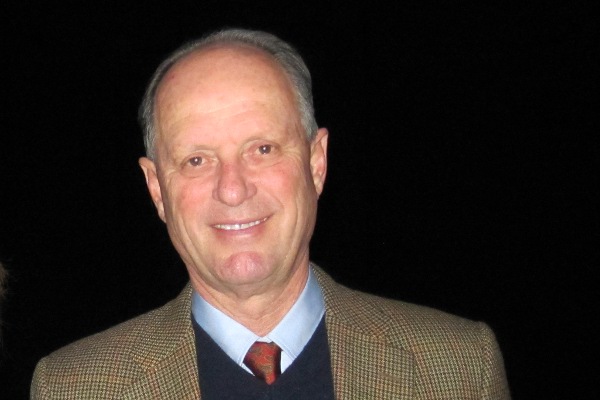
Jan 27, 2010 | Celebrities, Featured, Fresh Green Minute, Fresh Interviews, Green World, Most Popular, Podcast, podcast2, Policy, Silicon Valley Events
By Alison van Diggelen, host of Fresh Dialogues
Download or listen to this lively Fresh Dialogues interview
Audio PlayerWe welcome feedback at FreshDialogues.com, click on the Contact Tab | Open Player in New Window
Check out the new Fresh Dialogues YouTube Channel more exclusive interviews.
Robert Ballard, the ocean explorer of Titanic fame sat down with me in Silicon Valley to discuss his expeditions, global warming, and alternative energy. This respected scientist spoke candidly about global warming -“I’ll be honest, it’s too late, all the ice is going to melt.” READ the TRANSCRIPT
On the global warming controversy: Natural cycle or Human impact?
“Hey folks: it’s both. Whenever you have a tremendous controversy both sides tend to be right and wrong. You do have the natural interglacial warming that we’re experiencing, but you are increasing the severity of it with the human footprint. The concern most people have is that we can’t do much about the natural cycle, but we can do a lot about the human cycle. ..if you steepen it too much, evolution can’t keep up and you get extinction.”
On being Politically Correct
“Sometimes I see this tombstone that says, “the human race came and went but it was politically correct.” As a scientist I am not politically correct. My job is not to be politically correct. My job is to call it as I see it. And I see that the biggest problem the human race has is that there are too many of us.”
On the need to reduce our carbon footprint
(more…)
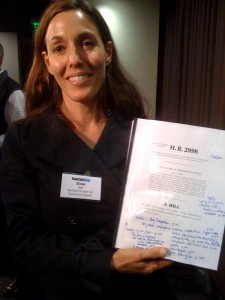
Jan 13, 2010 | Entrepreneurship & Innovation, Fresh Green Minute, Fresh Interviews, Green World, Nuclear Energy, Podcast, podcast2, Silicon Valley Events, Storage, Technology
By Alison van Diggelen, host of Fresh Dialogues
Download or listen to this lively Fresh Dialogues interview
Audio PlayerWe welcome feedback at FreshDialogues.com, click on the Contact Tab | Open Player in New Window

Elise Zoli, a partner with Goodwin Procter, is a specialist in energy and clean tech law; and teaches at MIT. I caught up with her at a Fountain Blue Green Transport Event where we discussed two hot areas in clean tech: energy storage and nuclear power. Elise explains the important role of energy storage in making solar and wind energy more reliable; and why she’d like to redefine energy storage to make it sexy. She’s coining a new phrase: “dispatchable renewable power.”
On making energy storage sexy
“Energy storage sounds like something that you don’t want to talk about, something that belongs in the closet. But the idea is to enable renewables (solar and wind) to have a greater chunk of the American demand…integrated storage flattens out the intermittency issues.”
On nuclear power
“The N word is difficult in the context of renewable …but most experts who look at climate change and energy security believe there is a significant role for nuclear. “
On nuclear waste and other impacts
“Nuclear has a favorable balance of environmental impacts. Every technology, even solar and wind, have their externalities. On balance, does it advance our climate change goals? The technology deserves to be considered.”
“For the traveling wave reactor they actually consume waste as fuel. The promise of the technology is to reduce waste…The material will be managed in place as opposed to having a long term waste repository.”
This is Part Two of the interview.
To check out Part One, where Elise explores the government’s role in clean tech and the stimulus package, click here.
The interview was recorded at the FountainBlue Clean Green Transport Conference in Santa Clara on July 6, 2009.
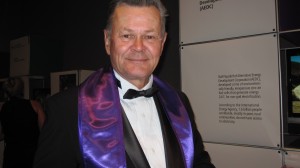
Jan 6, 2010 | Entrepreneurship & Innovation, Fresh Green Minute, Fresh Interviews, Fuel Cells, Green World, Podcast, podcast2, Silicon Valley Events, Social Entrepreneurs, Technology
By Alison van Diggelen, host of Fresh Dialogues
Download or listen to this lively Fresh Dialogues interview
Audio PlayerWe welcome feedback at FreshDialogues.com, click on the Contact Tab | Open Player in New Window
 Rolf Papsdorf is bringing green power to the people of Africa. Thanks to the Silicon Valley based Tech Awards 2009, the rest of the world is hearing about it. His company Alternative Energy Development Corporation manufactures zinc-air fuel cells to generate off the grid electricity for rural communities. His zinc-air fuel cell project, described as the largest in the world, brings light and energy to the village of Guyuni in South Africa, as well as job creation and online education to the community’s youth.
Rolf Papsdorf is bringing green power to the people of Africa. Thanks to the Silicon Valley based Tech Awards 2009, the rest of the world is hearing about it. His company Alternative Energy Development Corporation manufactures zinc-air fuel cells to generate off the grid electricity for rural communities. His zinc-air fuel cell project, described as the largest in the world, brings light and energy to the village of Guyuni in South Africa, as well as job creation and online education to the community’s youth.
This project echoes – in a small way – the aims of Bloom Energy’s KR Sridhar, who aims to bring Power to the People with its fuel cell design.
On the fuel cells technology
“We’re the only company in the world which produces a low cost zinc-air fuel cells manually rechargeable…we’re proud to say that we have no carbon footprint and are totally renewable. We recycle the zinc oxide to make new zinc using solar energy.”
On how he’s empowering South Africa
“Our passion really is empowerment. We supply them with basic electricity, we have skills development programs so that they can earn an income…only 3% of (the community) income goes towards energy, the rest is disposable income.” Rolf Papsdorf
Check back soon for the VIDEO of this exclusive Fresh Dialogues interview
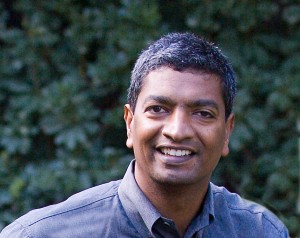
Dec 30, 2009 | Entrepreneurship & Innovation, Fresh Green Minute, Fresh Interviews, Green World, Podcast, podcast2
By Alison van Diggelen, host Fresh Dialogues
This month Bloom Energy CEO, KR Sridhar was picked as one of Time Magazine’s Tech Pioneers Who Will Change Your Life
The Time article references a recent Fresh Dialogues feature, Power to the People
SEE A RARE FRESH DIALOGUES VIDEO INTERVIEW WITH KR HERE
Read the transcript and listen to this exclusive Fresh Dialogues interview – KR explains how the Bloom Energy fuel cell will change the world and give power to the people.
Download or listen to this lively Fresh Dialogues interview
Audio PlayerWe welcome feedback at FreshDialogues.com, click on the Contact Tab | Open Player in New Window
SEE THE VIDEO INTERVIEW HERE – A FRESH DIALOGUES EXCLUSIVE 1. Bloom Energy: Fuel Cell Technology
2. Bloom Energy: Affordability is Essential Video
3. Bloom Energy: Mission to Change the World Video
To listen to an exclusive Fresh Dialogues interview with Kevin Surace, another Time Magazine Tech Pioneer Who Will Change Your Life click here
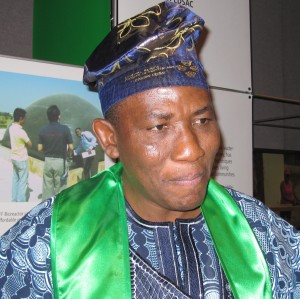
Dec 16, 2009 | Clean Tech, Entrepreneurship & Innovation, Fresh Interviews, Green World, Podcast, podcast2, Silicon Valley Events, Social Entrepreneurs, Technology
By Alison van Diggelen, host of Fresh Dialogues
Download or listen to this lively Fresh Dialogues interview
Audio PlayerWe welcome feedback at FreshDialogues.com, click on the Contact Tab | Open Player in New Window
The catchy title “Cows to Kilowatts” certainly won the attention of the crowds at the 2009 Tech Awards Gala in Silicon Valley, but the project won accolades for more than mere words. Dr. Joseph Adelegan, an Ashoka Fellow is a charismatic engineer who has found an effective way to harness the energy from slaughterhouse waste and won the $50,000 Intel Environment Award . He and his team at the Nigeria based Global Network for Environment and Economic Development Research, are creating cooking gas and electricity from effluent that might otherwise lead to harmful pollution.
What does the Tech Award mean to Dr. Adelegan?
“We’ve received several awards… so it’s not really receiving the award… but the opportunity to network, to meet great minds in Silicon Valley… see people who’ve gone through the same as you’ve gone through…We’ve seen scientists and inventors, visited Microsoft and Intel..we’ve seen people doing some encouraging things…Sometimes you think you are crazy doing this type of stuff, but you see that people are as crazy as you. You have to be crazy to be creative….” (We agreed there were LOTS of crazy creative people in Silicon Valley)
Why does Al Gore inspire him?
(more…)
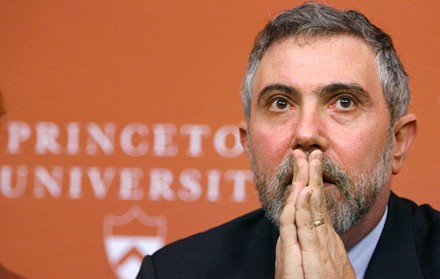
Dec 9, 2009 | Celebrities, Climate Legislation, Fresh Green Minute, Fresh Interviews, Green World, Podcast, podcast2, Policy, Silicon Valley Events
By Alison van Diggelen, host of Fresh Dialogues
Download or listen to this lively Fresh Dialogues interview
Audio PlayerWe welcome feedback at FreshDialogues.com, click on the Contact Tab | Open Player in New Window
As delegates gather in Copenhagen this week to thrash out a global treaty on climate change, the shrill from skeptics intensifies. It’s useful to listen to wisdom from Nobel Prize winning economist, Paul Krugman. In a recent interview, I asked Paul the question on many lips: Will climate legislation kill the economy?
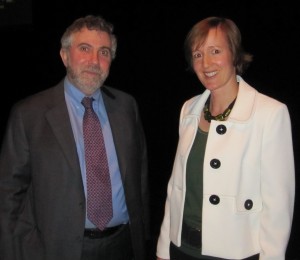 “If history is any guide… it’s just not a big deal,” says Krugman, citing the example of acid rain legislation which many people also said would kill the economy. “Dealing with it was cheaper than most estimates had suggested,” he says. “Given the incentives; the private sector found ways to generate a whole lot less acid rain.”
“If history is any guide… it’s just not a big deal,” says Krugman, citing the example of acid rain legislation which many people also said would kill the economy. “Dealing with it was cheaper than most estimates had suggested,” he says. “Given the incentives; the private sector found ways to generate a whole lot less acid rain.”
Krugman thinks the same will be true of carbon limits and has already explained his preference for cap and trade in a previous Fresh Dialogues segment.
We also discuss the power of his New York Times column and his influence on the Obama Administration. “We’re speaking across the transom…when I argue with them in my column this is a serious discussion…people in the administration do call me…it’s no longer this sort of Cold War as it was during the Bush years.”
And how does he view his role? “I’m trying to make this progressive moment in American history a success,” says Krugman.
But why not take a position within the administration to be more effective?
“I’m never going to be an insider type. You have to do bureaucratic maneuvering, be pretty good at being polite… reasonably organized…,” says the Pulitzer prize- winning columnist. “I’m none of those things. I can move into a pristine office and within three days it will look like a grenade went off.”
To read this segment transcript, click here.
(more…)










